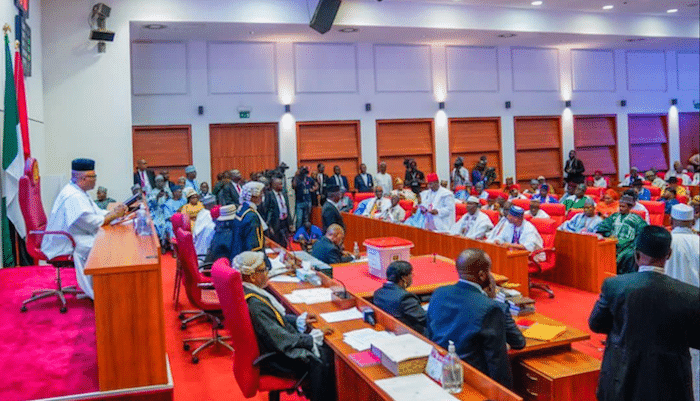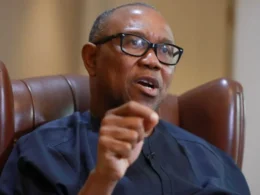The Senate ad hoc committee investigating alleged economic sabotage in Nigeria’s petroleum industry has postponed its much-anticipated public hearing indefinitely. Originally scheduled for September 10-12, 2024, the hearing was expected to shine a light on the challenges plaguing the country’s petroleum sector, especially concerning billions of dollars spent on refinery maintenance.
The committee’s chair, Senator Opeyemi Bamidele (APC, Ekiti Central), made the announcement late on Sunday, citing the need for “legislative exigencies” and more extensive consultations as key reasons for the delay. Bamidele explained that the postponement would allow the committee to further deepen its due diligence in the investigation, which aims to uncover critical practices and entities contributing to inefficiencies in the petroleum sector over the past decade.
The Senate had inaugurated the 15-member ad hoc committee on July 22, 2024, in response to widespread concerns about the mismanagement of Nigeria’s petroleum industry. A primary objective of the committee is to scrutinize the turnaround maintenance of the country’s refineries, which has cost the government billions of dollars with little to show in terms of improved production efficiency. The sector has long been viewed as a significant drain on Nigeria’s economy, with allegations of corruption, mismanagement, and operational inefficiencies.
The committee was tasked with identifying individuals and practices responsible for sabotaging the economic interests of the country, particularly through the mismanagement of public funds allocated to the maintenance and operation of Nigeria’s refineries. For years, Nigeria’s petroleum sector has been marred by inadequate production levels, a reliance on imported refined products, and recurring losses in the operations of state-owned refineries.
Senator Bamidele, while announcing the postponement, emphasized that the decision was made “purely and solely in the national interest” and was not intended to cause disruption. He assured all stakeholders, including government bodies, industry players, and civil society organizations, that they would be given ample notice once the hearing is rescheduled.
“The committee is committed to conducting a thorough investigation that will expose the entities and practices responsible for the downturn in the petroleum sector over the past decade,” Senator Bamidele said. “The postponement is to ensure that the process is as thorough and inclusive as possible.”
The lawmaker expressed regret for any inconvenience caused by the delay, acknowledging that many stakeholders were prepared for the public hearing. However, he assured them that the committee remains dedicated to its mandate and will continue its work behind the scenes. “We want to ensure that when the hearing is held, it will be comprehensive and result in meaningful outcomes for the petroleum sector and the Nigerian economy as a whole,” he added.
One of the key issues that the committee intends to address is the turnaround maintenance (TAM) of Nigeria’s four refineries, located in Port Harcourt, Warri, and Kaduna. These refineries have been operating far below capacity despite repeated claims of maintenance and upgrades. Over the years, billions of dollars have reportedly been spent on TAM, yet Nigeria remains heavily reliant on imported refined petroleum products to meet domestic demand.
The inefficiencies and alleged mismanagement surrounding the refineries have led to calls for greater accountability, and the ad hoc committee’s investigation is seen as a critical step toward identifying those responsible for the sector’s failures. In addition to refinery maintenance, the committee will also examine issues related to oil theft, illegal bunkering, and the diversion of petroleum products, all of which have contributed to significant revenue losses for the country.
The postponement has sparked concern among industry stakeholders and civil society groups, many of whom have been eagerly anticipating the public hearing. Various stakeholders, including representatives from the Nigerian National Petroleum Corporation (NNPC), private oil firms, and watchdog organizations, were expected to make submissions and provide testimony during the hearing.
Bamidele assured them that the committee is working diligently to ensure a more effective and transparent process. “The delay is not intended to sideline anyone,” he reiterated, adding that stakeholders will receive adequate notice when the hearing is rescheduled.
The committee has yet to provide a new date for the hearing but is expected to resume its work after concluding the necessary consultations. The public, along with the media, is also awaiting the committee’s next move as the investigation promises to uncover the root causes of the inefficiencies plaguing Nigeria’s petroleum industry.
As the country grapples with declining revenues from oil, largely due to operational inefficiencies and international market fluctuations, the findings from this investigation could play a pivotal role in shaping the future of Nigeria’s petroleum sector. The committee’s recommendations, once concluded, are expected to influence future policies aimed at improving the management and productivity of the sector, as well as restoring public confidence in the government’s ability to safeguard Nigeria’s economic interests.
In the meantime, the committee will continue its investigative efforts, ensuring that all avenues are explored to address the longstanding issues in the sector.









